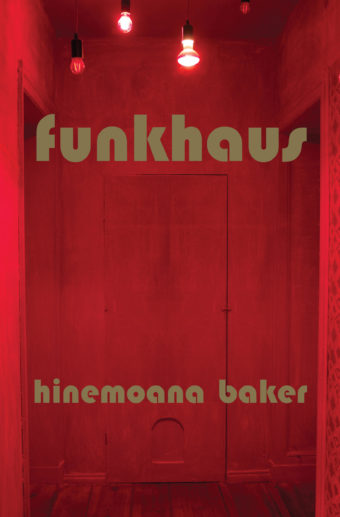Funkhaus is Hinemoana Baker’s fourth collection, her last being waha | mouth (2014), and with a gap of six years, is a book much anticipated by many. These intervening years have brought significant changes to Baker’s life, particularly her move to Berlin in 2015. Many Kiwi writers seem to end up in Berlin, and the themes of identity, home and belonging are perennial ones, but in Funkhaus Baker makes them feel fresh. The title draws on the German word funken, meaning to send a radio signal, and the poems within do indeed reach out, across borders, oceans, languages, vistas and the changing seasons. ‘My view is rooftops, winter-blue sky/and a chimney, she writes in ‘Bird Order’; contrasting with a later poem, ‘December’, where the invitation is to ‘Walk with me in summer mist under powerlines/where the loud tui bells out over the valley.
The collection is anchored by two strong poems dedicated to damaged buildings. ‘Mother’, the first poem in the book, was written in tribute to Tapu Te Ranga marae, which was destroyed in a fire in 2019. The second poem in the collection, ‘If I Had to Sing’, was commissioned for the reopening of Christchurch Art Gallery Te Puna o Waiwhetu in 2015. The marae and gallery stand as poignant symbols of devastation and (at least in the latter case) rebirth. ‘If I had to sing’ begins with the lines:
I have no idea what to call this rebirth
and yet I’m here to name it
to feed the new flame
with wood from the old.
These lines serve to frame the whole collection. Throughout Funkhaus, the old and new intermingle, rising together, falling away and apart, creating new ways of living and being in the world.
Some poetry collections tell a single story, while others coalesce around themes and the poet’s stylistic approach. Funkhaus falls firmly into this latter category, being only loosely and tangentially tied together. In this kind of collection, it’s the poet’s style that matters, and here Baker is at the top of her game.
Stylistically, Funkhaus is lyrical and musical; its lyricism, however, is punctuated by sudden shocking revelations and moments of searing dislocation. Many of the poems give the appearance of being on solid ground, but partway through a lurch in your stomach and the feeling of the ground suddenly falling away signal the poem is moving to a different place. For example, ‘Fox’ begins with a sighting of the animal in the snow, so the line ‘the dying in your arms of your own child’ simultaneously jumps out, but is then almost subsumed into the poem as a whole – the depiction of the fox, a plant growing from a cobblestone, a sandwich board with pictures of fruit. The poem ‘Aunties’ also moves quickly from colourful description to gut-wrenching (if matter-of-fact) harder truths.
Funkhaus is a significant achievement in that it manages to capture both the loveliness and awfulness of human existence. The language and backdrops are beautiful, but the realities the poet describes are difficult, including pain that is often unspoken. The collection packs a punch: a fist wrapped in delicate spiderwebs. From ‘December’: ‘I am a dark bird opening and closing its beak.’
This review was originally published on the Academy of NZ Literature site.



